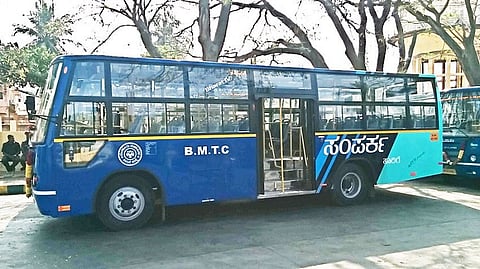

The nightmarish condition of Bengaluru’s traffic is no surprise. The number of vehicles registered in Bengaluru has more than doubled over the last 10 years according to the Karnataka Transport Department with average vehicular speed dropping to as low as 4km per hour.
The Times of India reports that the number of vehicles registered in the city stands at 70.28 lakh. This does not include vehicles registered in other states.
Ashish Verma, an expert on sustainable transportation at the Indian Institute of Science, Bengaluru, points out that there needs to be a fine mix of infrastructure-related improvements coupled with other policies that promote public transport and discourage use of private vehicles.
Some solutions that have been put forward are:
Lowering bus ticket prices
“Presently BMTC does not get any subsidies from the government. It is treated as a corporate body, which is expected to make its own profit. This does not occur anywhere else in the world,” says Ashish.
“Hence, there is no incentive for one to use public transport as the cost of riding a two-wheeler is cheaper than travelling in a bus. In addition, the bus would take more time,” he adds.
Ashish points out that buses are not always reliable as they often deviate from their schedules due to mixed-traffic conditions. He said, “When you assign priority, buses are able to travel faster with a higher level of reliability.”
Have dedicated bus lanes
“Lack of dedicated bus lanes which reduce the impact of traffic will mean two buses on the same route reaching at the same time,” he adds.
He also elucidates the need for smarter routes which is far more efficient than the existing routes.
“The bus route system has evolved organically with time, based on inputs from staff and citizens. But, it's more complex and is a classic problem of optimisation. A lot of it can be countered through scientifically rationalised routes and schedules. Implementing it can reduce the fleet requirement satisfying the current demand,” says Ashish.
Restrict registration of vehicles
“The government is doing wrong. They should restrict the vehicle inflow. Every day, they are registering around 300-400 vehicles in a day in Bengaluru. If all the rules are followed properly, even regarding granting of driving licences, then there should not be so many numbers of vehicles,” notes MN Sreehari, a Bengaluru-based traffic expert.
He points out that the government’s focus on increasing revenues is leading to this problem.
“They (the government) want revenue. This is the mistake of the authorities,” Sreehari adds.
Improve roads
Coming to infrastructure, Sreehari blames the deplorable condition of the city’s roads as the primary reason for the problem.
“Roads are in a very bad condition with potholes and construction work. Buses cannot move even at 15 km per hour. Every day, BMTC buses are supposed to cover 250 km, but delays and congestion result in them running less than 100 kilometres. You know who is to be blamed,” adds Sreehari.
Ashish says since public transport cannot give door-to-door connectivity, the ease of walking and cycling has to be kept in mind.
“As we know, Bengaluru is unfriendly for walking. Similarly, we don't have separate lanes for cycling in most parts of the cities. So, we can't really expect people to walk and use public transport,” he adds.
Check haphazard parking
Haphazard parking is also a major culprit. Sreedhari asks, “What are roads meant for?” Speaking of parked vehicles blocking traffic flow on city roads, he adds, “It should be totally disallowed.”
“In order to address the demand for parking space in city centres and busy areas, the authorities end up encouraging private transport at the cost of congestion and pollution,” echoes Ashish.
Ramp up metro railway
Expanding the metro railway network would be the only way to reduce traffic congestion given the amount of population the city has gained, experts note.
“The government should focus all its resources to complete the next phases of metro as soon as possible. Buses should complement the metro service,” Ashish adds.
Sridhar points out that irregular funding of the metro project should also be looked at, in order to avoid further delays.